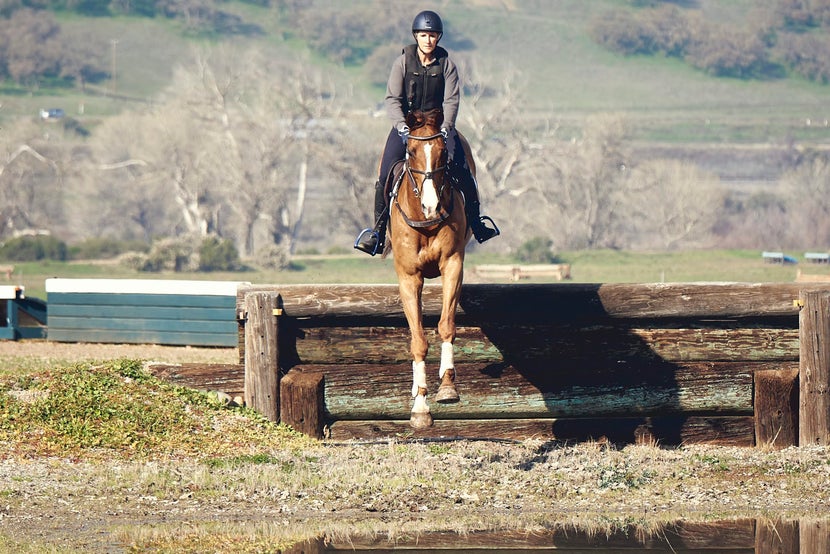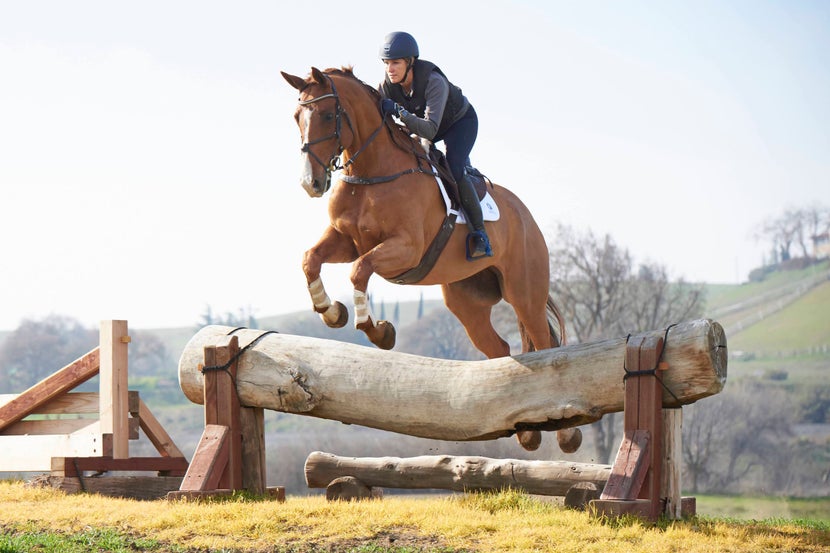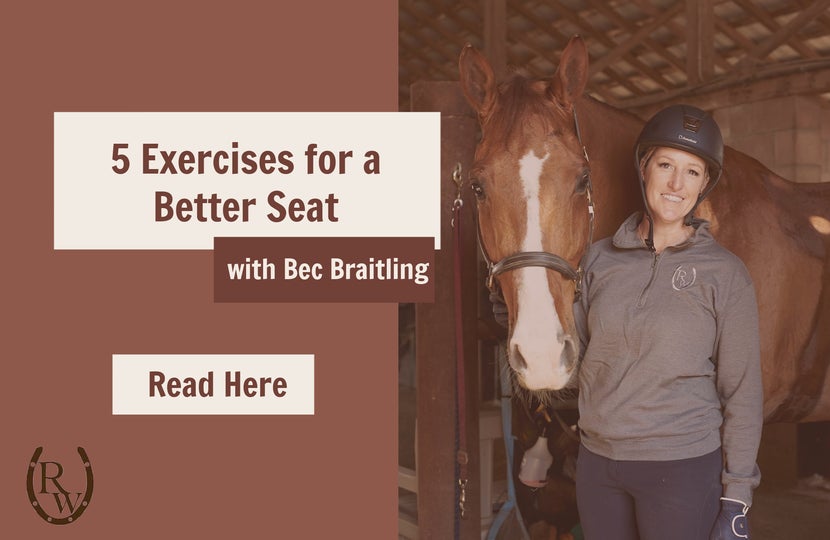Post Cross-Country
Horse Care & Recovery
Horse Care Tips From 5* Eventer & Sponsored Rider, Bec Braitling
When you're an eventer, the journey alongside your trusty equine companion may not be an easy one. A lot of hard work goes into each of the phases, but testing your horse's endurance during the cross-country phase can be especially demanding. It is important to pay close attention to your event horse while caring for them after their course to ensure they recover in tip-top shape. That's why we asked RW-sponsored rider Bec Braitling about her post-ride routine as a 5* eventer. Having traveled, competed, and coached all over the world, Bec has years of experience with taking care of sport horses. Follow along with us for her insight on what to do (or not do) when it comes to maintaining horses after cross-country!
Bec's XC Post-Ride Routine

Q: What does your cool down at the end of your ride look like?
A: For me, the big thing is obviously getting them cool straight away. There have been new studies on scraping cool water off right away versus leaving the water on your horse for longer to let it heat up, and then scraping it away. My horse right now gets really hot and sweaty, so I get as much cold water on him as possible consistently.
Basically, the vets are looking to see if your horse is in distress. Sometimes, a horse might be quite highly strung after a cross-country course; it's very difficult for them to relax and not keep heating up. The quicker you can get to a hose the better, versus a sponge and water bucket situation. Walking a little bit in between also helps. Water, water, water! You can be pretty constant about it and get as much water as you can on them, like 5 minutes straight of getting them wet. It really does make a big difference in getting the heat and temperature out of their body, especially by focusing on the vascular areas like the throat and legs.
Q: Do you use any liniments or poultices? Why or why not?
A: I actually don't! I grew up poulticing the horses, and I will have to say that once I started running more horses—and I didn't always have a lot of help—it was a lot of work for me the morning after trying to remove all the poultice. I've gotten away from doing that, and I've never used liniments. For me, at the FEI level, I'm so nervous about what is okay and legal. I'm a bit of a minimalist; coming from Australia, I think there's this "less is more" mentality. I also get nervous about possible burning or irritation, as I have a lot of skin-sensitive horses. I'm open to it, but honestly, it's not a ritual; I believe my management program keeps my horses sound.
Q: Do you use a cooling sheet or therapy blanket? Why or why not?
A: I don't, but I do have a RevitaVet Therapy System that I actually really love! I'm a bit of a person to use it first on myself to see whether it really works, then use it on the horses. I do like Back On Track, and I'll use the Back On Track Quick Wraps for shipping. I could get behind the science of ceramic therapy, but sometimes it's honestly too hot in California to put any blankets or sheets on before you compete. My good horse naturally runs really hot, and the last thing I want to do is sweat him out before we compete. Again, I'm more of a minimalist in that way!
I do get regular body done on the horses, especially at competitions. I also give them PEMF (pulsed electromagnetic field therapy) treatments if I think they need it. I think it's important for people to not feel guilty about not doing all these therapy things, especially if you're a one-man show. Not much replaces horses with good training and good muscling of the top line, so I feel it's important we don't get in our heads about supplements and blankets and such. Don't make it complicated, because I don't think you ever want to rely on those things as your crutch as to why the horse didn't do well or this or that happened. I'm sure they help a lot, but it ultimately comes back to training.
Q: How do you approach your horse's post-ride care nutritionally? Do you supplement them with anything after a competition?
A: I will say I am a big fan of electrolytes! I do use and buy a lot of pastes for big work days, and I also use KER Restore as a daily supplement. For us here, we live in a sort of variable climate; it can be both very hot and cold, which can be hard on the horses. I am a big believer in Vitamin E, as we have a bit of a deficiency and our horses are not out in pasture. I think you have to always make sure you're in touch with that, but I'm not a big supplement person. Good, high-quality hay really does make a difference for the horses, and they look good because of it (and not because I have to give them too many supplements). Especially for the competing horses, I'm a believer in electrolytes to help my horses recover in the most natural way they can—because of the rules and regulations. Practice your electrolyte program at home when you're training, like when you're galloping them, so you can gauge how their muscles are going to feel the next day. I take electrolytes myself for my own muscle recovery!

Q: Do you practice your 10-minute box routine?
A: I think we used to be a lot more serious about having a real routine, and we are definitely trying to keep that going, but things have changed in the vet box. I am really conscious of looking at the horse's respiration and heat, making sure I'm getting their body temperature down. I think training your horses to ice as early as you can is great, especially if you have one that will stand in a bucket in a full hoof-to-knee sort of submersion. We literally obsess about overheating in the tendons. I look at their legs and feel them with my hands before and after each ride, all the time, every day! I'm a big believer in being hands-on. You become pretty hypersensitive to your horse that way, so you notice things before they escalate into something worse.
Q: What do you need to have in your vet box with you every time?
A: I carry a stethoscope with me all the time to listen to their heart. I also compete with a heart rate monitor and use it when I gallop; I use it more to make sure I'm getting their heart rate high enough, because my horse finds galloping on the flat quite easy. Getting them past that aerobic state and going into anaerobic is a big thing for me in my training. Evolving with the way the sport is evolving is important.
Q: What is one piece of advice you would like to leave readers with when it comes to caring for their event horse?
A: I think you just have to really know your horses well by spending enough time with them—as much as you can. Knowing but also not getting trained by your horse that you're so stuck on a concept you can't progress, because you believe that's the only way the horse is going to do something. The big thing I see when I go to teach: someone says, "Oh he can't do that." Well, he can (or he could), so it's more about presenting things to the horse in a different way sometimes. We cannot progress with that type of thought process! You have to be really strong in your mind, but not so strong that you're too stubborn to actually bend or take on new concepts and ideas. I've had the luxury of riding a lot of different horses, and that's allowed me to not go down a rabbit hole. When it's a one-rider-one-horse situation, I think it's very easy to become tunnel-visioned in the direction that your horse goes. Have an open mind every day, and don't put limitations on your horse; horses grow out of things, sometimes faster than we give them credit for. Your horse may be ready to move on, and you need to move on!
Closing Thoughts
We hope you enjoyed learning about some of Bec Braitling's expert methods for caring for her sport horses. Having a post-ride routine that works for you and your event horse is important to aid in their recovery after they're off the cross-country course. Should you have any questions, please contact our friendly customer care team at 1-800-620-9145 or info@ridingwarehouse.com. Happy riding!

